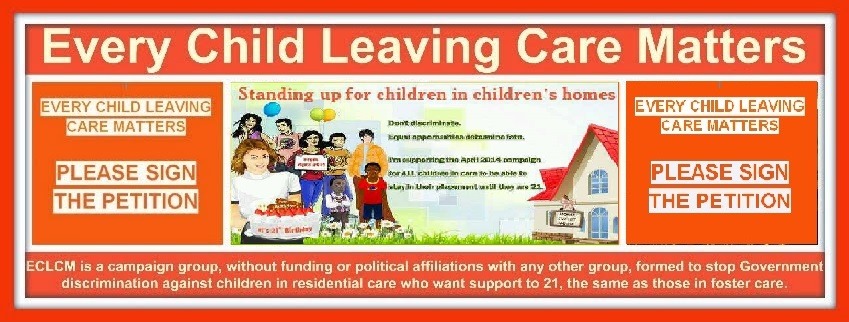In 2012, the
government introduced the Care Leaver’s Charter. The Charter isn’t law, but a voluntary code
for local authorities, a series of pledges towards children in their care
intended to ensure that they are properly cared for and their needs are met
when they are ready to leave care.
The Charter
includes some wonderful principles that we at ECLCM support wholeheartedly. The
local authorities promise young people “to respect and honour your identity”
and to “value and support important relationships”. Under the Charter, councils pledge to
believe and listen to young people. This has been a long term aim for all those
campaigning for the rights of children and young people in care and is very
welcome. It gets better:
“We will
help you push aside limiting barriers and encourage and support you to pursue your goals in whatever ways we
can. We will believe in you, celebrate you and
affirm you.”
“We will take time to listen to you, respect, and strive to understand your point of view. We will place your needs, thoughts and feelings at the heart of all decisions about you, negotiate with you, and show how we have taken these into account”
As the
comedian Jimmy Cricket used to say “and there’s more”… Under the Charter, the
local council will also offer young care leavers practical and financial help
as well as emotional support. They will be a “lifelong champion” and be
there for them when they need it to be. All wonderful stuff! https://www.gov.uk/government/publications/care-leavers-charter
Recently,
Edward Timpson, Minister for Children and Families reported that
123 councils had signed up to the ‘Care Leavers’ Charter’ each “pledging
to provide young people leaving care with the vital help and support they need
as they take their first steps into adulthood.”
Mr Timpson
reminded us of the plight that young care leavers can find themselves in. “Too
often I hear stories about young people leaving care feeling isolated,
unsupported and facing endless barriers when all they are trying to achieve is
the routine, everyday things that others take for granted - such as applying
for their first job, getting information about college or university, or
finding their first home.”
He even
helpfully shared statistics reminding us that:
•
Over 1,100 care leavers aged 16 or over are now
living in independent accommodation without any formalised support
•
34% of care leavers aged 19 or over are not in
education, employment or training
•
just 6% of care leavers aged 19 or over went on to
higher education
It will come as no surprise that we at ECLCM agree with the Minister that these low levels of achievement are not good enough for care leavers. We also support the Charter and all the aspirations it contains.
Clearly, given this confident fanfare at ministerial level, might care leavers now expect that their needs will be addressed by the Charter?
Sorry Minister, this is where we part company. ECLCM do not share your optimism. We DON’T see the Care Leavers’ Charter in its present form as a safeguard for children leaving care. It cannot work unless there is legislation requiring government and local authorities to ensure that all young people leaving care receive the support they need at least until they are 21. This must include young care leavers being allowed to remain in their placement when it is in their interests, agreed by the provider and what they wish to do – in fact, the same rights bestowed by the Children and Families Act 2014 on children leaving foster care.
We have repeatedly asked, but so far, nobody has been able or prepared to explain to us what the differences are between children in children’s homes and children in foster care. We are willing to wager if we placed a mixed group of kids from foster care and children’s homes in a line, the minister and his advisors would not be able to identify which children were which. Similarly, nobody has explained to us what the differences are in the needs of young people leaving foster care and residential care. They can’t of course … because there aren’t any.
ECLCM suggest to the minister that the Charter be:
- Amended
to include the right for all children to remain in their placement until
they are 21 when it is consistent with their assessed needs and wishes and
agreed by the provider;
- Enshrined
in legislation to mirror arrangements included in the Children &
Families Act 2014 for fostered children;
- Be
appropriately funded and supported;
- Be
included in the inspection and regulation regimes used to inspect local
authorities.
We suspect
that then the number of young people from care who appear in the national
disadvantage statistics would fall significantly within 3 years.

No comments:
Post a Comment